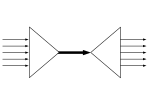
Back راديو معرف برمجيا Arabic Софтуерно дефинирано радио Bulgarian Ràdio Definida per Software Catalan Softwarově definované rádio Czech Softwaredefineret radio Danish Software Defined Radio German Radio definida por software Spanish Tarkvaraline raadio Estonian رادیو نرمافزاری Persian Ohjelmistoradio Finnish
| Multiplexing |
|---|
 |
| Analog modulation |
| Related topics |
| Passband modulation |
|---|
 |
| Analog modulation |
| Digital modulation |
| Hierarchical modulation |
| Spread spectrum |
| See also |
Software-defined radio (SDR) is a radio communication system where components that conventionally have been implemented in analog hardware (e.g. mixers, filters, amplifiers, modulators/demodulators, detectors, etc.) are instead implemented by means of software on a computer or embedded system.[1] While the concept of SDR is not new, the rapidly evolving capabilities of digital electronics render practical many processes which were once only theoretically possible.
A basic SDR system may consist of a computer equipped with a sound card, or other analog-to-digital converter, preceded by some form of RF front end. Significant amounts of signal processing are handed over to the general-purpose processor, rather than being done in special-purpose hardware (electronic circuits). Such a design produces a radio which can receive and transmit widely different radio protocols (sometimes referred to as waveforms) based solely on the software used.
Software radios have significant utility for the military and cell phone services, both of which must serve a wide variety of changing radio protocols in real time. In the long term, software-defined radios are expected by proponents like the Wireless Innovation Forum to become the dominant technology in radio communications. SDRs, along with software defined antennas are the enablers of cognitive radio.[2]
- ^ Markus Dillinger; Kambiz Madani; Nancy Alonistioti (2003). Software Defined Radio: Architectures, Systems and Functions. Wiley & Sons. p. xxxiii. ISBN 0-470-85164-3.
- ^ Amaral, Cristiano (2021). Guia Moderno do Radioescuta. Brazil: Amazon. p. 333. ISBN 978-65-00-20800-9.